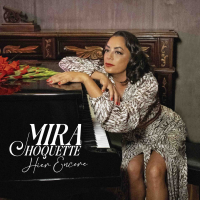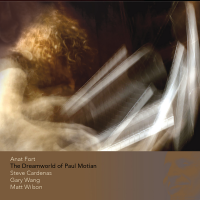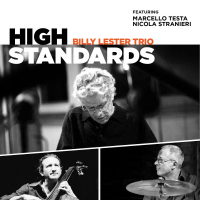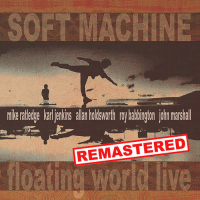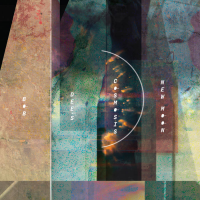Home » Jazz Articles » Multiple Reviews » CTI Masterworks: The Second Batch
CTI Masterworks: The Second Batch

Freddie Hubbard
trumpet1938 - 2008

Stanley Turrentine
saxophone, tenor1934 - 2000

Hubert Laws
woodwindsb.1939
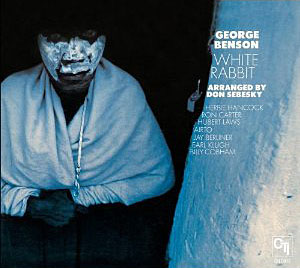 George Benson
George BensonWhite Rabbit
CTI Masterworks
1971 (Reissued 2011)
After three late-1960s A&M albums with mastermind Creed Taylor prior to the creation of CTI Records, guitarist

George Benson
guitarb.1943
White Rabbit was (and remains) an anomaly in Benson's prodigious catalogue, with its heavy orchestration by CTI regular

Don Sebesky
arranger1937 - 2023

Earl Klugh
guitar, acousticb.1953

Charlie Byrd
guitar1925 - 1999

Laurindo Almeida
guitar1917 - 1995
Despite some truly dated material—in particular the title track, an overblown look at Jefferson Airplane's drug-drenched, 1967 hit single—Benson transcends it all, with some brilliant playing, even as "White Rabbit" strives to break out of Sebesky's overbearing bolero-like arrangement.

Herbie Hancock
pianob.1940

Hubert Laws
woodwindsb.1939
That said, Sebesky's gentle strings and harp on "Theme from 'Summer of 42'" are far more successful—and appropriate. It's easy listening, to be sure, with Benson joining Klugh on nylon string guitar, as the song moves into light Latin territory, but the more change-heavy take on a classical piece—Villa Lobos' "Little Train," taken from the composer's "Bachianas Brasilerias #2," is an album highlight; Benson's fleet-fingers matched by Hancock and bolstered by bassist

Ron Carter
bassb.1937

Billy Cobham
drumsb.1944
Another dated track, The Mamas and The Papas' pre-Summer of Love hit, "California Dreamin,'" begins with an almost non-sequitur of Spanish tinges but, more than anywhere else on the album, demonstrates the simpatico interplay between Benson and Klugh, suggesting that Klugh was, indeed, a star in the making. Klugh's gorgeous intro to Benson's closing "El Mar"—the album's only original—sets the stage for an 11-minute highlight that suggests a stylistic breadth to Benson that, despite a subsequent career living as much in the pop world as anywhere else, has continued to this day.
An anomaly in Benson's catalogue, perhaps, and one with its fair share of weaknesses to offset its many strengths, this CTI Masterworks reissue of White Rabbit remains, in many ways, a curiosity that transitions between his more mainstream efforts and the soulful jazz/pop star he was about to become; not without its merits, but not essential either.
 Milt Jackson
Milt JacksonSunflower
CTI Masterworks
1972 (Reissued 2011)
With a series of mainstream dates to his credit dating back to the early 1950s—not to mention charter membership in the now-legendary

Modern Jazz Quartet
band / ensemble / orchestrab.1952

Charlie Parker
saxophone, alto1920 - 1955

John Coltrane
saxophone1926 - 1967
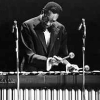
Milt Jackson
vibraphone1923 - 1999

Lionel Hampton
vibraphone1908 - 2002

Gary Burton
vibraphoneb.1943

Bobby Hutcherson
vibraphone1941 - 2016

Don Sebesky
arranger1937 - 2023
Here, with a harpist and 11-piece string ensemble, Sebesky gives Jackson's opening ballad, "For Someone in Love," a burnished sheen, but it can't take away from the vibraphonist's ethereal touch, flugelhornist Freddie Hubbard's more propulsive approach, or pianist Herbie Hancock's abstract impressionism; all making for a stunning intro to an album that posits Jackson in even broader contexts than his discography to date.
The Legrand/Berman ballad, "What Are You Doing the Rest of Your Life?," the Grammy-nominated song from Richard Brooks' 1969 film, The Happy Ending, swings with the kind of graceful elegance that Jackson had honed in the MJQ, but Hancock's more exploratory accompaniment drives the tune into unexpected places, even as

Ron Carter
bassb.1937
What was, back in the day, side one of Sunflower was, then, a bit of a shift for Jackson into more accessible territory, but nothing earth-shattering. Tectonic plates didn't move for those who put on side two of the disc, either, but opening with The Stylistics' oft-covered hit, "People Make the World Go Round,"was something new, as the vibraphonist entered light funk territory. Carter, locked-in with drummer

Billy Cobham
drumsb.1944

Stanley Clarke
bassb.1951

Alphonso Johnson
bassb.1951

Weather Report
band / ensemble / orchestraThe closing bonus track (not new, it's been on CD issues since 1997), Jackson's "SKJ," feels like something of an anomaly, both in its hard-swinging pulse and production—rawer, and less refined than the rest of the set. It speaks to the truth that musicians may move around stylistically during their long careers, but they don't forget where they came from. A beautiful record that expands an already broad view of Jackson, this CTI Masterworks reissue brings one of the vibraphonist's best albums back into print.
 Ron Carter
Ron CarterAll Blues
CTI Masterworks
1973 (Reissued 2011)
In the 1960s and 1970s, few bassists were as ubiquitous as

Ron Carter
bassb.1937

Miles Davis
trumpet1926 - 1991

Kenny Burrell
guitar, electricb.1931

Archie Shepp
saxophone, tenorb.1937
Given his wide-ranging musical interests, Carter's discography as a solo artist remains more than a little curious—largely right down the middle, though he does place himself in a more prominent position as a soloist and melodist. The introduction of his piccolo bass—a smaller upright that, tuned a fourth higher than its lower cousin and, thus, sitting somewhere between double-bass and cello—giving him an instrument capable of taking the lead and remaining undeniably a bass, while occupying a range more appealing to ears of a larger listening public that often had trouble hearing the lyricism of the original low-end instrument. Carter introduced the piccolo bass on Blues Farm, his 1973 CTI debut, but that more pasteurized date was far less successful than its follow-up, All Blues, just a few months later.
Rather than working with the larger cast of characters he did on

Mahavishnu Orchestra
band / ensemble / orchestrab.1971
Still, mainstream needn't imply that this mix of four Carter originals, Miles Davis' iconic title track, and one standard, "Will You Still Be Mine?," is anything resembling safe, as Carter delivers the Matt Dennis/Tom Adair/Paul Weirick chestnut as an overdubbed bass/piccolo bass feature, closing the album on an unexpected note.
While pianists like Herbie Hancock brought a combination of impressionistic flair and propulsive funk to his CTI dates, and

Bob James
pianob.1939

Fourplay
band / ensemble / orchestra
Roland Hanna
piano1932 - 2002
The bulk of the album features saxophonist

Joe Henderson
saxophone1937 - 2001
Another winner in the CTI Masterworks series of remastered reissues, All Blues proves there's plenty of room for exploration, even in the middle of the mainstream.
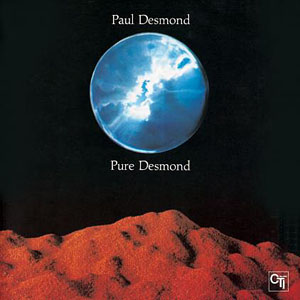 Paul Desmond
Paul DesmondPure Desmond
CTI Masterworks
1974 (Reissued 2011)
With a dry tone, and unhurried phrasing definitive of the emergent West Coast Cool—a relaxed alternative to the edgier hard bop coming from New York—alto saxophonist

Paul Desmond
saxophone, alto1924 - 1977

Dave Brubeck
piano1920 - 2012
Pure Desmond was only one of two albums the saxophonist made for CTI (though he did record two albums with Creed Taylor for A&M, before the producer started his own label), but it's the absolute winner of the two. A small group album featuring the same three bonus tracks as a previous CD version, with CTI Masterworks' warm remastering and beautiful mini-vinyl-like soft digipaks, it represents a welcome return to print of an album that, despite alcoholism and heavy smoking, finds Desmond in great form just three years before his death in 1977.
With label staple Ron Carter swinging comfortably with Modern Jazz Quartet and longtime Desmond musical cohort, drummer

Connie Kay
drums1927 - 1994

Duke Ellington
piano1899 - 1974

Antonio Carlos Jobim
piano1927 - 1994

Ed Bickert
guitar1932 - 2019

Phil Nimmons
clarinetb.1923

Rob McConnell
trombone1935 - 2010

Joe Pass
guitar1929 - 1994

Herb Ellis
guitar1921 - 2010

Jim Hall
guitar1930 - 2013
The tempo never gets past medium, but there's a simmering energy on some of he material, in particular the Jerome Kern chestnut, "Till the Clouds Roll By," heard here in two versions: the original album version, where Bickert's solo is the height of linear invention and occasionally bluesy bend; and a slightly longer alternate take where he builds a solo filled with rich voicings and single note phrases constantly accompanied with periodic chordal injections. The mix and overall tone of the alternate take is a little rawer, with Carter's bass a more visceral punch in the lower register.
Light Latin rhythms also define the session, with the by-then-popular "Theme from M*A*S*H" given a light bossa treatment, as is Jobim's "Wave," which closes the original album on a graceful note, but here acts as a gateway to alternate takes including the ambling opener, "Squeeze Me," and the

Django Reinhardt
guitar1910 - 1953
With a supportive group that clearly gets the value of less over more, the aptly titled Pure Desmond stands, alongside The Paul Desmond Quartet Live (A&M/Horizon, 1975)—his other album with Bickert—as the pinnacle of this West Coast cool progenitor's career.
 Jim Hall
Jim HallConcierto
CTI Masterworks
1975 (Reissued 2011)
Amongst the many CTI classics of the 1970s, few stand the test of time as well as guitarist Jim Hall's Concierto, an ambitious album that, in its original form, married one side of modern mainstream with a second taken up by a 19-minute version of Joaquin Rodrigo's 1939 piece for classical guitar and orchestra, "Concierto de Aranjuez." That Miles Davis and

Gil Evans
composer / conductor1912 - 1988

Chick Corea
piano1941 - 2021
Sebesky perfectly balances the innate economy and astute improvisation acumen of Hall's group with written scores that maximize the beauty of space and nuanced understatement. Trumpeter

Chet Baker
trumpet and vocals1929 - 1988

Gerry Mulligan
saxophone, baritone1927 - 1996

Harvey Mason
drumsb.1947

John Scofield
guitarb.1951
As is the case on the lion's share of CTI recordings, bassist Ron Carter stokes the engine room—this time with drummer

Steve Gadd
drumsb.1945
Hall's career has been founded on a thoughtful and restrained economy that's made every note, every voicing, count. What's most remarkable about his playing here is how perfect his choices still are, nearly 40 years later. It's often easy to look back and reassess performances for what they might have been, but there's absolutely nothing here that could (or should) be changed; pianist Roland Hanna also plays with a combination of melodic invention and Spartan lyricism on the two versions of "You'd Be So Nice," including a bonus alternate that, taken at an ever-so-slightly-slower tempo, breathes a tad more than the album version; though, with slightly softer edges, it's easy to see why Hall and producer Creed Taylor made the choice they did.
With its reading of "Concierto de Aranjuez" standing easily beside the Davis/Evans version on Sketches of Spain, Concierto deserves to be considered an equal classic, and a masterpiece in its own right—proof that music can be deep, modern, timeless and accessible.
Tracks and Personnel
White Rabbit
Tracks: White Rabbit; Theme from "Summer of '42"; Little Train; California Dreaming; El Mar.
Personnel: George Benson: electric guitar; John Frosk: trumpet, flugelhorn; Alan Rubin: trumpet, flugelhorn; Wayne Andre: trombone, baritone horn; Jim Buffington: French horn; Phil Bodner: flute, alto flute, oboe, baritone horn; Hubert Laws; flute, alto flute, piccolo; George Marge: flute, alto flute, clarinet, oboe, English horn; Romeo Penque: clarinet, bass clarinet, alto flute, oboe, English horn; Jane Taylor: bassoon; Herbie Hancock: electric piano; Earl Klugh: guitar (1-4); Jay Berliner: guitar; Ron Carter: bass; Billy Cobham: drums; Airto Moreira: percussion, vocal (1, 4); Phil Kraus: vibraphone, percussion; Gloria Agostini: harp; Don Sebesky: arranger.
Sunflower
Tracks: For Someone in Love; What Are You Doing the Rest of Your Life?; People Make the World Go Round; Sunflower; SKJ (Bonus Track).
Personnel: Milt Jackson: vibraphone; Freddie Hubbard: flugelhorn; George Marge: clarinet,bass clarinet,alto flute, English horn; Phil Bodner: flute, alto flute, piccolo, English horn; Romeo Penque: alto flute, oboe, English horn; Herbie Hancock: piano, electric piano (5); Jay Berliner: guitar; Ron Carter: bass; Billy Cobham: drums; Ralph MacDonald: percussion; Max Ellen: violin; Paul Gershman: violin; Emanuel Green: violin; Charles Libove: violin; Joe Malin: violin; David Nadien: violin; Gene Orloff: violin; Elliot Rosoff: violin; Charles McCracken: cello;, George Ricci: cello; Alan Shulman: cello; Margaret Ross: harp; Don Sebesky: arranger, conductor.
All Blues
Tracks: A Feeling; Light Blue; 117 Special; Rufus; All Blues; Will You Still Be Mine.
Personnel: Ron Carter: bass, piccolo bass; Joe Henderson: tenor saxophone (1, 3-5); Roland Hanna: piano (1-5); Billy Cobham: drums and percussion (1-5); Richard Tee: electric piano (3).
Pure Desmond
Tracks: Squeeze Me; I'm Old Fashioned; Nuages; Why Shouldn't I?; Everything I Love; Warm Valley; Tell the Clouds Roll By; Mean to Me; Theme from M*A*S*H; Wave; Nuages (Alt. Tk.); Just Squeeze Me (Alt. Tk.); Till the Clouds Roll By (Alt. Tk.).
Personnel: Paul Desmond: alto saxophone; Ed Bickert: electric guitar; Ron Carter: bass; Connie Kay: drums; Don Sebesky: musical supervision.
Concierto
Tracks: You'd Be So Nice to Come Home To; Two's Blues; The Answer is Yes; Concierto de Aranjuez; Rock Skippin' at The Blue Note (Bonus Track); Unfinished Business (Bonus Track); You'd Be So Nice to Come Home To (Alt. Tk.); The Answer is Yes (Alt. Tk.); Rock Skippin; at The Blue Note (Alt. Tk.).
Personnel: Jim Hall: guitar; Chet Baker: trumpet (1-4, 7, 8); Roland Hanna: electric piano (2, 3. 8), piano (1, 4, 5, 7, 9); Ron Carter: bass; Steve Gadd: drums (1-5, 7-9); Don Sebesky: arranger; Paul Desmond: alto saxophone (1, 4, 6, 7).
Tags
Comments
PREVIOUS / NEXT
Support All About Jazz
 All About Jazz has been a pillar of jazz since 1995, championing it as an art form and, more importantly, supporting the musicians who make it. Our enduring commitment has made "AAJ" one of the most culturally important websites of its kind, read by hundreds of thousands of fans, musicians and industry figures every month.
All About Jazz has been a pillar of jazz since 1995, championing it as an art form and, more importantly, supporting the musicians who make it. Our enduring commitment has made "AAJ" one of the most culturally important websites of its kind, read by hundreds of thousands of fans, musicians and industry figures every month.


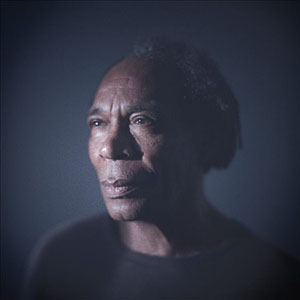
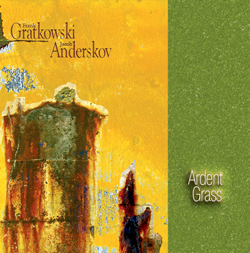

 Buy Now
Buy Now



